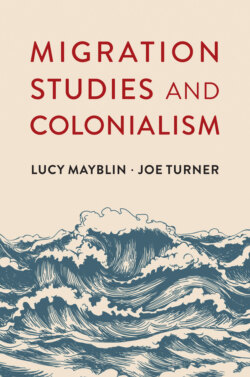Migration Studies and Colonialism

Реклама. ООО «ЛитРес», ИНН: 7719571260.
Оглавление
Lucy Mayblin. Migration Studies and Colonialism
Contents
Guide
Pages
Migration Studies and Colonialism
Copyright page
Acknowledgements
Foreword: On the Beginnings of Migration: Europe and Colonialism
1 Introduction. Migration studies and colonialism
The growing call to ‘decolonize’ the social sciences
Does migration studies need to think about colonialism?
Postcolonialism, decoloniality and Third World approaches to international law
Structure of the book
2 Time and Space: Migration and Modernity. Introduction
Problematizing the concept of modernity in the social sciences
Eurocentrism
North, South, East and West in colonial modernity
Modernity, migration and development
Can Eurocentrism be overcome?
Conclusion
3 ‘Race’ and Racism in International Migration. Introduction
Empire and the invention of race
Knowledge, modernity and huMan
Race, violence and slavery
Racism’s two registers: biology and culture
Race, movement and immigration
Conclusion
4 Putting Sovereignty, Citizenship and Migration in Dialogue with Past and Present Colonialisms. Introduction
Connected histories, connected sociologies
Migration as decolonization
Indigenous sovereignty and immigration
No borders?
Conclusion
5 Deconstructing Forced Migration, Rethinking Asylum. Introduction
Asylum is a human right: postcolonial and decolonial perspectives on ‘man’ and ‘human’
The myth of difference and the silencing of colonialism
Man and human as a colonial construct
Uprooting: deconstructing forced migration
Necropolitics: governing the uprooted through death
Conclusion
6 Towards a Colonial Account of Security and Borders. Introduction
Terrorism and race
Anti-Muslim racism as ‘bio-cultural’
Colonial rule and security
Towards a global account of security and borders
Securitization in the Global South
Postcolonial borders (in Palestine)
Decolonizing borders
Political violence and terror
Conclusions
7 Gender, Sexuality, Colonialism … and Migration. Introduction
Gender and sexuality in migration studies
Intersectionality
Decolonial feminism: the coloniality of gender
Ungendering and anti-blackness
Queer-of-colour critique
Conclusion
8 Conclusion
References
Index
POLITY END USER LICENSE AGREEMENT
Отрывок из книги
Lucy Mayblin and Joe Turner
Our modern world has been significantly shaped by historical processes and structures that have been in place from the late fifteenth century onwards. These have shaped our institutions and our understandings. We can use the figure of Columbus and his voyages to stand for the beginning of these processes and structures and how they have been understood within Europe. As Locke wrote in the late seventeenth century, ‘in the beginning all the World was America’. That is, in their discovery of the Americas, Europeans believed that they were encountering earlier versions of themselves. This laid the groundwork for particular understandings of hierarchies among and between populations across the world. If those peoples encountered by early European travellers were effectively understood as being their ancestors, then Europeans could both show them the (predetermined) future and be unconcerned about their elimination. The first justifies the belief in ‘development’; the second suggests that the disappearance of other cultures, peoples, is not a consequence of European actions but a quasi-natural phenomenon.
.....
There are criticisms to be made of the extent to which world systems theory adequately accounted for, or then instrumentalized, race and gender in the world system (Grosfoguel 2011). Nevertheless, this is undeniably a corner of migration studies which has sought to incorporate an account of historical colonial power relations in seeking to make sense of the present. Equally, Latin American decolonial work on the ‘coloniality of power’ is indebted to world systems theory even as it departs from its primarily economic focus (Quijano 2000). It is here that we see emerging some decolonial analyses of migration which are alive to the importance of colonial histories, and indeed presents (Grosfoguel, Oso and Christou 2015).
A postcolonial awareness is also visible in, if not central to, other areas of migration studies. Scholars who research the European context often, for example, note the movement of migrants from former colonies to former metropoles in the second half of the twentieth century (Geddes and Scholten 2016). These ‘postcolonial’ migrations have given rise to many studies which, though more often cited in sociologies of race and ethnicity or cultural studies (for example, Cohen and Jonsson 2011; Gilroy 2002b, 2004; Hall 1996c; Wemyss 2009), nevertheless overlap with the concerns of migration researchers (for example, race and racism as legacies of empire are strong themes in Joppke 1999). Those who research the settler colonies as ‘countries of immigration’ also often note the colonial history of those countries, albeit often too briefly and rarely with an engagement with settler colonialism as an ongoing phenomenon. Those who work on what is increasingly dubbed ‘South–South’ migration are, furthermore, offering a wellspring of non-Eurocentric analytical frameworks which, if not necessarily centring colonial histories, are certainly working against Eurocentrism and are very much alive to the connected colonial histories that link different parts of the world (Fiddian-Qasmiyeh 2015; Fiddian-Qasmiyeh and Daley 2019).
.....